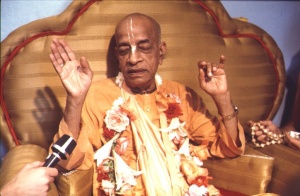SB 11.20.1

A.C. Bhaktivedanta Swami Prabhupada
TEXT 1
śrī-uddhava uvāca
vidhiś ca pratiṣedhaś ca
nigamo hīśvarasya te
avekṣate 'raviṇḍākṣa
guṇaṁ doṣaṁ ca karmaṇām
SYNONYMS
śrī-uddhavaḥ uvāca—Śrī Uddhava said; vidhiḥ—positive injunction; ca—also; pratiṣedhaḥ—prohibitive injunction; ca—and; nigamaḥ—the Vedic literature; hi—indeed; īśvarasya—of the Lord; te—of You; avekṣate—focuses upon; araviṇḍa-akṣa—O lotus-eyed one; guṇam—good or pious qualities; doṣam—bad or sinful qualities; ca—also; karmaṇām—of activities.
TRANSLATION
Śrī Uddhava said: My dear lotus-eyed Kṛṣṇa, You are the Supreme Lord, and thus the Vedic literatures, consisting of positive and negative injunctions, constitute Your order. Such literatures focus upon the good and bad qualities of work.
PURPORT
At the end of the previous chapter, Lord Kṛṣṇa stated, guṇa-doṣa-dṛśir doṣo guṇas tūbhaya-varjitaḥ: "Focusing upon material piety and sin is itself a discrepancy, since actual piety means to transcend both of them." Śrī Uddhava now pursues this point so that Lord Kṛṣṇa will give a more elaborate explanation of this difficult subject matter. Śrī Uddhava here states that the Vedic literatures, which constitute the laws of God, deal with piety and sin; therefore, it must be clarified how one transcends activities recommended in the Vedas. According to Śrīla Viśvanātha Cakravartī Ṭhākura, Uddhava suddenly understood Lord Kṛṣṇa's purpose in the words He had just spoken, and to induce the Lord to elaborate upon this interesting point Uddhava outwardly challenged the Lord's statement.